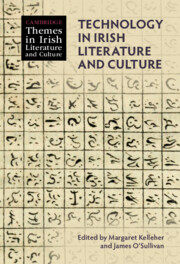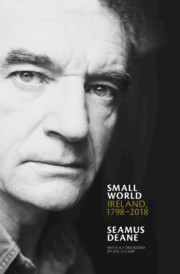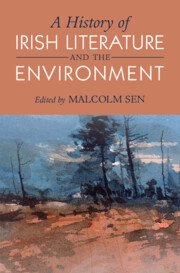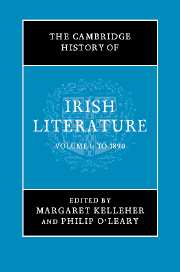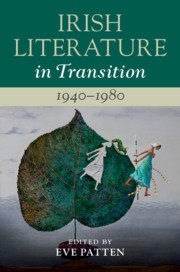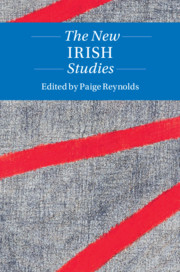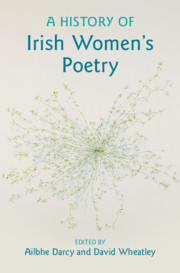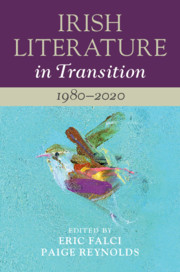Technology in Irish Literature and Culture
Part of Cambridge Themes in Irish Literature and Culture
- Editors:
- Margaret Kelleher, University College Dublin
- James O'Sullivan, University College Cork
- format: Adobe eBook Reader
- isbn: 9781009192477
Find out more about Cambridge eBooks
Price is not yet set USD
Adobe eBook Reader
Other available formats:
Looking for an inspection copy?
This title is not currently available for inspection. However, if you are interested in the title for your course we can consider offering an inspection copy. To register your interest please contact [email protected] providing details of the course you are teaching.
-
Technology in Irish Literature and Culture shows how such significant technologies—typewriters, gramophones, print, radio, television, computers—have influenced Irish literary practices and cultural production, while also examining how technology has been embraced as a theme in Irish writing. Once a largely rural and agrarian society, contemporary Ireland has embraced the communicative, performative and consumption habits of a culture utterly reliant on the digital. This text plumbs the origins of the present moment, examining the longer history of literature's interactions with the technological and exploring how the transformative capacity of modern technology has been mediated throughout a diverse national canon. Comprising essays from some of the major figures of Irish literary and cultural studies, this volume offers a wide-ranging, comprehensive account of how Irish literature and culture have interacted with technology.
Read more- Provides comprehensive analyses of how technologies of media and communication have consistently transformed both the form and content of Irish literature and cultural production
- Reconsiders many of digital culture's most prevalent issues-socioeconomics, surveillance, the self, relationships-through the perspective of Ireland's national and diverse literary canon
- Demonstrates robust inter-disciplinary research in literary and cultural studies
Reviews & endorsements
'The scope afforded by this edited collection allows readers to trace historical undercurrents in Irish writing in a rapidly expanding field of literary inquiry and digital production. It will be essential reading for those interested in a thorough literary historical treatment of the changing and often contradictory powers, pleasures, and uses of technology as a theme, a method, and a mode of enquiry in Irish literature and culture.' Maria Mulvany, Irish University Review
Customer reviews
Not yet reviewed
Be the first to review
Review was not posted due to profanity
×Product details
- format: Adobe eBook Reader
- isbn: 9781009192477
Table of Contents
Introduction Margaret Kelleher and James O'Sullivan
Part I. Genealogies:
1. Print as technology: the case of the Irish language 1571–1850 Marc Caball
2. Printing and publishing technologies:
1700–1820 Máire Kennedy
3. The optical telegraph, the United Irish press, and Maria Edgeworth's 'White Pigeon' Joanna Wharton
4. Technologies of sound: telephone/gramophone Chris Morash
Part II. Infrastructures:
5. Electric signs and echo chambers: the stupidity of affect in modern Irish literature Barry Sheils
6. Literature and the technologies of radio and television Robert Savage
7. The re-tuning of the world itself': Irish poetry on the radio Ian Whittington
Part III. Invention:
8. Technology, writing and place in medieval Irish literature Máire Ní Mhaonaigh
9. The critique of sola scriptura in a tale of a tub and STEM in Gulliver's travels Sean Moore
10. Technology and Irish modernism Kathryn Conrad
11. W. B. Yeats, the revival and scientific invention Aoife Lynch
12. James Joyce, Irish modernism and watch technology Katherine Ebury
13. Technology, terminology and the Irish language, past and present Sharon Arbuthnot
Part IV. The Digital:
14. Irish literary feminism and its digital archive(s) Margaret Kelleher and Karen Wade
15. Consoling machines in contemporary Irish fiction Claire Lynch
16. 'At me too someone is looking': staging surveillance in Irish theatre Victor Merriman
17. Technology in contemporary Irish poetry: data at 'the edge of language' Anne Karhio
18. Irish digital literature James O'Sullivan.
Sorry, this resource is locked
Please register or sign in to request access. If you are having problems accessing these resources please email [email protected]
Register Sign in» Proceed
You are now leaving the Cambridge University Press website. Your eBook purchase and download will be completed by our partner www.ebooks.com. Please see the permission section of the www.ebooks.com catalogue page for details of the print & copy limits on our eBooks.
Continue ×Are you sure you want to delete your account?
This cannot be undone.
Thank you for your feedback which will help us improve our service.
If you requested a response, we will make sure to get back to you shortly.
×
